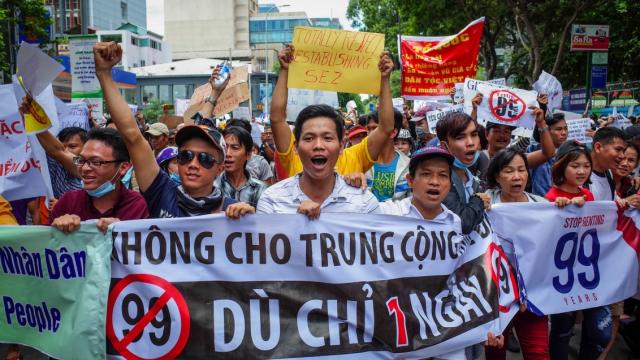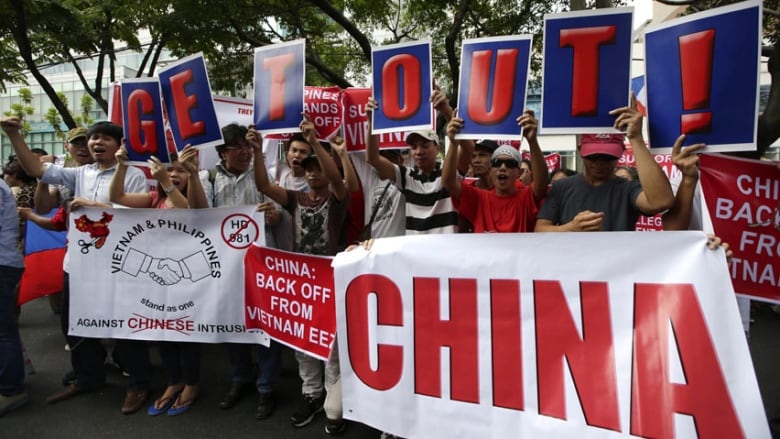
This is Part 22 in a series about Radical Municipalism looking at ways people worldwide are organizing in their cities to build power from the bottom up. Read Part 1 (Brazil), Part 2 (Rojava), Part 3 (Chiapas), Part 4 (Warsaw), Part 5 (Bologna), Part 6 (Jackson, Miss.), Part 7(Athens), Part 8 (Warsaw & New York), Part 9 (Reykjavík), Part 10 (Rosario, Argentina), Part 11 (Newham, UK), Part 12 (Valparaiso, Chile), Part 13 (Porto Alegre, Brazil), Part 14 (Montevideo, Uruguay), Part 15 (Venezuela), Part 16 (Cape Town), and Part 17 (Congo), Part 18(Jemna, Tunisia), Part 19 (Gdansk, Poland), and Part 20 (Senegal) and Part 21 (Mumbai, India).
Widespread protests against Special Economic Zones are shaking the stability of Vietnam's government. It was unheard of that thousands of people would take to the country's streets, forcing the government to delay its plan of extending pro-business zones that allow corporations to evade regulations.
But as today's Vietnam reveals an embrace of neoliberalism and its authoritarian government becomes ever more draconian in response to opposition voices, a popular municipalist movement is on the rise that is challenges the establishment power, shaking Vietnam's once all-powerful, one-party system.
Special protests for Vietnam's SEZ
300 people in Phan Ri Cua City, in Binh Thuan province, held the first rally against the country's Special Economic Zones draft law on June 7, 2018. The demonstration grew from local anger and protests over a highly polluting Chinese coal power station power.
Two days later, approximately 50,000 workers walked out from footwear companies in Ho Chi Minh City. And on June 10, demonstrations followed in cities including Hanoi, Nghe An and Da Nang.
The draft law aimed to allow foreign investors to lease Vietnamese land for 99 years. One protest theme was the rejection of further Chinese investment. Vietnam's giant northern neighbor has invaded and dominated the country for centuries. The latest ongoing dispute concerns the South China Sea, with China further militarizing the contested islands last year.
Vietnam's three special economic zones are planned for Vân Đồn, an island province in northeast Vietnam; Bắc Vân Phong, situated strategically within the South China Sea; and Phú Quốc, an island in the Gulf of Thailand. Protesters fear China will use SEZs to extend its influence more broadly.
A variety of concerns sparked Vietnam's first mass protests since the Vietnam War. Special Economic Zones have been widely criticized as they allow corporations to flout labour laws, minimum wage and workers' safety.
Chinese corporations have also caused anger due to the ecological destruction caused by an extensive bauxite mine in the Central Highlands and the Formosa Steel Company plant in Vũng Áng (Hà Tĩnh province), which spilled toxic waste causing a marine crisis on Vietnam's north coast.
The SEZ push is connected to wider government corruption and corporate land-grabs. As a result, local struggles against the policy have collectively galvanized against Vietnam's political and economic establishment.
Growing authoritarianism, growing resistance
June's mass protests also took aim at a new cybersecurity law that has similarities to Chinese Internet censorship legislation. Vietnam's National Assembly passed the law on June 12, 2018. Unusually, the National Assembly, which frequently rubber stamps proposals from the one-party state, halted discussions of the SEZ law until Autumn 2018, then delayed it again to May 2019. But despite the protests' impact, authorities dealt with protesters severely.
In Binh Thuan, police shot tear gas and water cannons against peaceful protesters, leading to street battles with protesters shortly occupying the regional government offices. Protesters were beaten across Vietnam, and over 1,000 were arrested.
On the streets, police used tear gas, water cannons and sound cannons in an effort to push back the demonstrators.
By November 2018, Radio Free Asia reported more than 100 people faced prison terms after the mass protests. And critics of the Vietnamese regime faced violent attacks, even before the recent popular uprising.
For context, Vietnam in 2015 changed its penal code so that those challenging the state can be sentenced to death – even for merely spreading "propaganda". By December 2018, the Vietnam Human Rights Network reported that the country holds some 200 political prisoners. Numerous dissidents have also fled the country.
As June's SEZ protests began, many prominent activists were placed under house arrest. The pre-arrests decentralized the movement, as people from all walks of life took to the streets to protest government corruption and rising inequality.
Analyzing the growing movement for democracy, researcher Anh-Susann Pham Thi explained how it has galvanized those who are fighting against a repressive state. In doing so, activists and non-activists are facing four strategic options: “Hiding, fleeing, creating and merging.”
Hiding, said Pham Thi, means creating safe spaces to resist, or hiding in plain view, for instance through anonymous social media or graffiti. Fleeing means leaving Vietnam to somewhere safe from where activists can challenge the regime. An example of "creating" is the No-U football club, formed in 2011. (The Hanoi-based football club provides a safe space for grassroots democratic organizing and political conversations; despite harassment from the regime, it remains shielded since the government cannot prevent people's right to sport.)
The fourth way is merging, meaning that various struggles build toward an intersectional struggle. Merging transforms the struggle against Chinese influence. Otherwise it would be merely a nationalist struggle against SEZs. Through intersectionalism, the movement becomes a fight over local environmental sovereignty and the sovereignty of people against repression. Alongside decentralization, these are municipalist traits; worldwide, municipalism offers a non-nationalist basis to reject neoliberalism with arguments for local sovereignty.
Same same, but different
The neoliberal economic and political ideology appears misplaced considering Vietnam's history, in which it beat the U.S. in a colonialist and ideological war of communism vs. capitalism. In reality, the people lost this war. Millions died and war crimes were extensive, including against neighboring Cambodia, sparking further genocide. The U.S. ground troops also lost in this war.
Capitalists ultimately lost and won. First, the military industrial complex profited immensely. Isolated and impoverished, Vietnam was forced to open up its economy to foreign investment. The top-down repressive state offered some programs to rebuild society, such as the minimum wage, healthcare and education. But by the mid-1990s it had fully opened its doors to neoliberalism, leading to austerity, inequality and corruption.
In essence, Vietnam took the worst of both worlds: a repressive one-party state wrapped in a red flag, pushing a hardline neoliberal agenda.
Not so long ago, Vietnam's regime seemed untouchable. For three months in early 2011, I travelled across the Central Highlands, exploring how extractive capitalism like mining destroys indigenous livelihoods.
Going to and seeing places that were technically off-limits, the corporate expansion into the country became clear. Factories swiftly rising on the edge of cities. Industrial expansion tearing through highland forests. Back then there was no sense, even from strong critics, that the status quo would or could change. The regime's strong grip started at the local level, as block wardens would report on neighborhoods to the police. You had to register to stay in people's houses. Speakers in public places broadcast government propaganda, even in remote villages.
But since summer 2018, an outburst of indignation has been widely discussed and shared by commentators. Even former party leaders are criticizing the government's direction.
The resistance is not strictly radical municipalist. It is more than noteworthy, in a global age of increased authoritarianism, how Vietnam repression is focused on blocking radical municipalist attempts to build counter power – by banning local organizing and building top-down power in the streets.
Reciprocally, as is true across continents, radical municipal tools provide the means to dismantle those forms of authoritarianism, building counter-power from the street upwards – something the Vietnamese people appear now poised to do.














